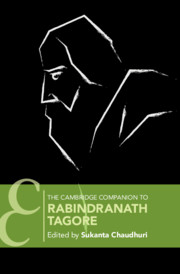Book contents
- Frontmatter
- Contents
- List of Illustrations
- Notes on Contributors
- Preface
- Note on Conventions and Practices
- 1 Rabindranath Tagore: From Art to Life
- 2 A Garland of Many Tagores
- Part I Overviews
- Part II Studies
- 12 Women, Gender, and the Family in Tagore
- 13 On the Seashore of Endless Worlds: Rabindranath and the Child
- 14 Tagore's View of History
- 15 Tagore's View of Politics and the Contemporary World
- 16 Tagore's Santiniketan: Learning Associated with Life
- 17 Tagore and Village Economy: A Vision of Wholeness
- 18 An Ecology of the Spirit: Rabindranath's Experience of Nature
- 19 Rabindranath and Science
- 20 Rabindranath Tagore as Literary Critic
- 21 Tagore's Aesthetics
- 22 Rabindranath, Bhakti, and the Bhakti Poets
- 23 Tagore and the Idea of Emancipation
- 24 Tagore's Thoughts on Religion
- 25 Rabindranath Tagore and Humanism
- List of Tagore's Works Cited, with Index
- Further Reading
- General Index
25 - Rabindranath Tagore and Humanism
from Part II - Studies
Published online by Cambridge University Press: 24 December 2019
- Frontmatter
- Contents
- List of Illustrations
- Notes on Contributors
- Preface
- Note on Conventions and Practices
- 1 Rabindranath Tagore: From Art to Life
- 2 A Garland of Many Tagores
- Part I Overviews
- Part II Studies
- 12 Women, Gender, and the Family in Tagore
- 13 On the Seashore of Endless Worlds: Rabindranath and the Child
- 14 Tagore's View of History
- 15 Tagore's View of Politics and the Contemporary World
- 16 Tagore's Santiniketan: Learning Associated with Life
- 17 Tagore and Village Economy: A Vision of Wholeness
- 18 An Ecology of the Spirit: Rabindranath's Experience of Nature
- 19 Rabindranath and Science
- 20 Rabindranath Tagore as Literary Critic
- 21 Tagore's Aesthetics
- 22 Rabindranath, Bhakti, and the Bhakti Poets
- 23 Tagore and the Idea of Emancipation
- 24 Tagore's Thoughts on Religion
- 25 Rabindranath Tagore and Humanism
- List of Tagore's Works Cited, with Index
- Further Reading
- General Index
Summary
An act of hospitality can only be poetic.
– Jacques DerridaThe idea of the human, which played a central role in the thought-world of Rabindranāth Tagore, was invoked by him in ‘Sabhyatār sangkat’ (‘Crisis in Civilization’, 1941), his last address in Santiniketan, to envisage a possible future on the other side of a global civilizational crisis:
As I look around I see the crumbling ruins of a proud civilization strewn like a vast heap of futility. And yet I shall not commit the grievous sin of losing faith in Man. I would rather look forward to the opening of a new chapter in his history after the cataclysm is over and the atmosphere rendered clean with the spirit of service and sacrifice…. A day will come when unvanquished Man will retrace his path of conquest, despite all barriers, to win back his lost human heritage.
Tagore did not live to see the full genocidal impact of the Nazi regime, but had he done, he might still not have endorsed the anti-humanist sweep of Adorno's famous observation on the silencing of poetry, the most refined expression of human language: ‘[T]o write a poem after Auschwitz is barbaric, and that corrodes also the knowledge which expresses why it has become impossible to write poetry today.’ To revivify civilization cannot be anything but a human project; crisis, however deep, can only be contested in Rabindranath's thinking by the figure of the human. Yet the idea of the human, at least in its essentialist formulation, has been under severe pressure in recent times. The attack took its sustenance from Nietzsche, one of the first architects of the anti-humanist gesture.
In European modernity, the human, in its essentialist formulation, travels from Renaissance painters and thinkers to the Cartesian discovery of the centred cogito to the ethics of human dignity propounded by Kant. Each of these conceptions argues for a common presence of the human across histories and cultures, subverting the idea of difference. Nietzsche famously questioned this idea of ‘man as an aeterna veritas [eternal truth], as something constant in the midst of all flux, as a sure measure of things’ by noting the lack of historical sense in philosophers and concluding that there are no eternal facts, just as there are no absolute truths.
- Type
- Chapter
- Information
- The Cambridge Companion to Rabindranath Tagore , pp. 416 - 429Publisher: Cambridge University PressPrint publication year: 2020
- 1
- Cited by



